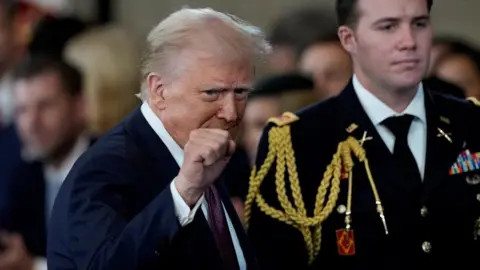Trump makes 'two sexes' official and scraps DEI policies
 Pool/Reuters
Pool/ReutersUS President Donald Trump issued executive orders shortly after he was sworn in to change the US government's policies on gender and diversity, following through on promises he made on the campaign trail.
He rolled back orders from the Biden administration that the Trump White House called "unpopular, inflationary, illegal, and radical practices within every agency and office of the Federal Government".
Two of the orders he revoked included a Biden directive aimed at preventing discrimination based on gender identity or sexual orientation.
Trump also signed an order recognising two sexes only - male and female – and declaring that they cannot be changed.
"These sexes are not changeable and are grounded in fundamental and incontrovertible reality," the order says.
It adds: "'Sex' is not a synonym for and does not include the concept of 'gender identity'."
In his inaugural address earlier in the day, Trump used different phraseology, saying: "As of today, it will henceforth be the official policy of the United States government that there are only two genders, male and female."
Trump has made wider promises about what conservatives decry as "woke" culture, gender and diversity, equality and inclusion (DEI) programmes.
Another directive that he revoked had been designed to address "racial equity and support for underserved communities."
An administration official said one of the orders would "end DEI inside the federal government", cutting funding to DEI programmes across all agencies and including a review of offices renamed because of DEI initiatives.
Several large US companies have ended or scaled back their DEI programmes since Trump was elected, including McDonald's, Walmart and Facebook parent company Meta.
Others, like Apple and retailers Target and Costco, publicly defended their existing programmes.
DEI supporters see the programmes as a way to correct lingering discrimination based on race, sexuality and other characteristics.
The idea received renewed attention in the wake of racial justice protests after the murder of George Floyd in 2020.
However, the landscape around diversity programmes has changed since 2023, when the US Supreme Court banned US universities from considering an applicant's race as part of their admissions process.
The policy, known as affirmative action, was intended to counteract historic racial and ethnic disparities in higher education.
Trump's return to power coincided with growing criticism from the right and religious conservatives of the expansion of transgender rights in the US.
Trump espoused a traditional view of gender throughout the 2024 campaign, and he and his allies attacked Democrats for supporting transgender rights.
Project 47, the official policy platform for the Trump campaign, promised to cut federal funding for "radical gender ideology" as well as "inappropriate racial, sexual, or political content on our children."
He has criticised policies that allow transgender athletes - school-age players, college athletes and professionals - to play on teams that align with their gender identity, arguing this could harm women's sports programmes.
Trump and his fellow Republicans also called for banning certain kinds of medical treatment for transgender minors.
One of the Trump's most notable political advertisements declared his opponent, Kamala Harris, was "for they/them" while "President Trump is for you."
The order declaring only two official sexes could have wide-ranging implications. Some US and global health experts have said singling out individuals based on their gender identity or expression can be harmful to physical and mental wellbeing.
The World Health Organisation warns that, "Rigid gender norms also negatively affect people with diverse gender identities, who often face violence, stigma and discrimination as a result, including in healthcare settings."
On Monday, Trump signed a different executive order aimed at withdrawing the US from the WHO.
Clarification 22 January 2025. This story and headline were updated to reflect that although Trump used the phrase "two genders" in his inaugural address, the subsequent executive order used the phrase "two sexes".
